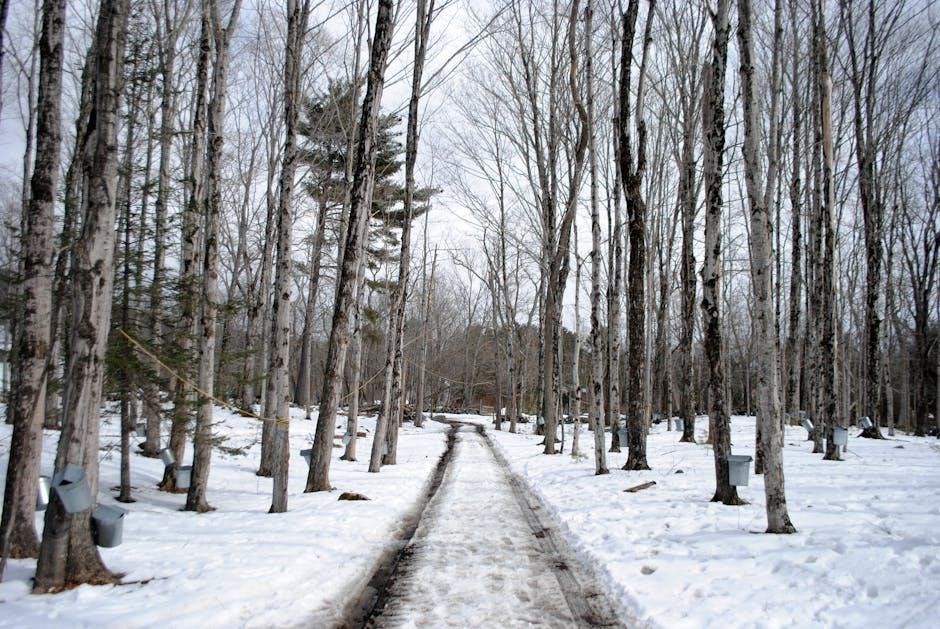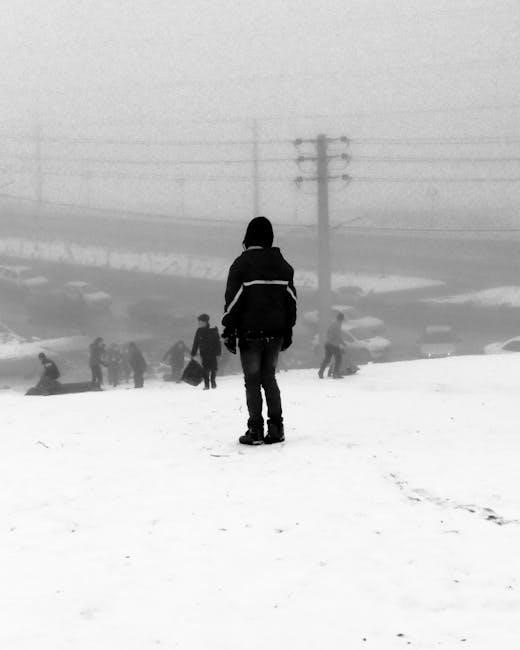collected poems of robert frost pdf
Robert Frost’s Collected Poems is a comprehensive anthology showcasing his mastery of rural American life, nature, and human emotion through timeless, evocative verse, now widely available in PDF format.
Overview of the Collection
Robert Frost’s Collected Poems offers a comprehensive compilation of his poetic works, capturing the essence of rural American life and human introspection. The collection includes seminal pieces like The Road Not Taken and Stopping by Woods on a Snowy Evening, reflecting Frost’s mastery of nature, isolation, and existential themes. First published in 1969, this anthology remains a definitive resource, featuring bibliographical notes and textual changes made by Frost himself. The PDF edition enhances accessibility, allowing readers to explore Frost’s profound insights into human existence and the natural world. This collection is a testament to Frost’s enduring legacy as a poet whose work continues to resonate universally.
Historical Significance of the PDF Edition
The PDF edition of Robert Frost’s Collected Poems holds significant historical value as it preserves his works for modern readers. First published in 1969, this collection became a standard reference, ensuring Frost’s poetry remains accessible. The digital format allows global distribution, making his rural themes and philosophical reflections widely available. It also includes Frost’s own textual revisions, offering insight into his creative process. This edition bridges the past and present, maintaining the integrity of Frost’s original works while embracing digital advancements. The PDF format ensures his legacy endures, providing future generations with a reliable source of his poetic genius.
Key Themes in Robert Frost’s Poetry
Robert Frost’s poetry explores nature, human existence, isolation, and the tension between society and individuality, offering profound insights into life’s complexities through his unique rural American lens.
Nature as a Central Theme
Nature is a pervasive theme in Robert Frost’s poetry, often serving as a backdrop for exploring human emotions and philosophical reflections. His poems frequently depict rural landscapes, such as forests, fields, and snow-covered woods, which symbolize both beauty and isolation. Works like Stopping by Woods on a Snowy Evening and Birches illustrate Frost’s ability to draw profound insights from natural imagery. Nature in his poetry is not merely a setting but a mirror of human experience, evoking contemplation on life’s complexities and the interplay between individual existence and the vast, indifferent natural world. This theme remains central to his legacy, resonating deeply with readers.
Exploration of Human Existence
Robert Frost’s poetry delves deeply into the complexities of human existence, exploring themes of identity, morality, and the search for meaning. His works often present individuals confronting choices and challenges, as seen in The Road Not Taken, where a traveler faces a symbolic fork in the road, reflecting life’s inevitable decisions. Frost’s portrayal of rural life offers a lens through which universal human struggles are examined, blending simplicity with profound philosophical depth. His poems invite readers to reflect on their own journeys, making his exploration of human existence both relatable and enduring. This introspective approach underscores his lasting influence on modern poetry.
Themes of Isolation and Loneliness
Robert Frost’s poetry often explores themes of isolation and loneliness, reflecting the human condition through rural settings. Poems like The Road Not Taken and Stopping by Woods on a Snowy Evening depict solitary figures grappling with choices and solitude. Frost’s work captures the quiet introspection of individuals in nature, emphasizing the emotional distance between people. While his characters often find strength in isolation, the poems also reveal a profound sense of loneliness, highlighting the tension between self-reliance and the need for connection. This duality underscores Frost’s nuanced portrayal of human existence, making his exploration of isolation and loneliness both poignant and universal. His work continues to resonate with readers seeking solace in shared experiences of solitude.
Society and Individuality
Robert Frost’s poetry delves into the tension between societal expectations and individuality, often through rural settings that symbolize both community and personal isolation. Poems like Mending Wall explore the friction between tradition and self-determination, as characters navigate the boundaries of societal norms. Frost’s work frequently portrays individuals questioning the conventions of their surroundings, emphasizing the struggle to maintain personal identity within a collective framework. His exploration of this theme highlights the universal human experience of balancing conformity with uniqueness. Through subtle yet profound observations, Frost invites readers to reflect on how society shapes—and sometimes restricts—individual freedom, offering a timeless commentary on the human condition. His poetry remains a powerful lens for examining these enduring tensions.
Notable Poems in the Collection
Robert Frost’s Collected Poems features iconic works like The Road Not Taken and Stopping by Woods on a Snowy Evening, showcasing his poetic mastery and timeless appeal in PDF formats.
The Road Not Taken
One of Robert Frost’s most celebrated poems, The Road Not Taken, explores themes of choice and individuality through a traveler’s dilemma in a yellow wood. The poem, first published in 1916, reflects Frost’s mastery of symbolism and rural settings. Its profound message about life’s decisions resonates universally. Written during Frost’s time in England, it was inspired by his friendship with poet Edward Thomas. The poem’s enduring popularity stems from its relatable imagery and philosophical depth. Available in the Collected Poems of Robert Frost PDF, it remains a cornerstone of his work, symbolizing the human struggle with choice and regret.
Stopping by Woods on a Snowy Evening
Robert Frost’s Stopping by Woods on a Snowy Evening is a serene yet profound poem that captures a moment of introspection in a snow-covered landscape. The speaker, drawn to the woods’ beauty, pauses briefly before continuing his journey, symbolizing life’s fleeting nature. First published in 1922, this poem exemplifies Frost’s mastery of rural imagery and philosophical undertones. Its calm tone contrasts with the underlying themes of duty and mortality. Available in the Collected Poems of Robert Frost PDF, this piece remains a cherished work, offering readers a moment of quiet reflection and universal insight into life’s inevitable path.
Mending Wall
Robert Frost’s Mending Wall explores themes of tradition, isolation, and human interaction through the annual ritual of repairing a stone wall. First published in 1914 in North of Boston, the poem delves into the speaker’s questioning of the wall’s necessity, while his neighbor adheres to the adage, “Good fences make good neighbors.” This dialogue reflects Frost’s nuanced examination of rural life and societal norms. The poem’s timeless appeal lies in its universal exploration of barriers—both physical and metaphorical. Available in the Collected Poems of Robert Frost PDF, it remains a cornerstone of his work, showcasing his mastery of subtlety and depth in storytelling.
Birches
Robert Frost’s Birches is a poignant exploration of nature and human experience. The poem, first published in 1916 in Mountain Interval, captures the image of birch trees bent by snow, symbolizing the interplay between natural forces and human intervention. Frost reflects on the cyclical nature of life, where flexibility and resilience are key to enduring challenges. The poem’s nostalgic tone and vivid imagery evoke a deep connection to the rural landscape. Available in the Collected Poems of Robert Frost PDF, Birches remains a timeless piece, offering insights into the human condition through its universal themes and Frost’s signature lyrical style. Its enduring appeal lies in its balance of simplicity and profound symbolism.

Style and Structure of Frost’s Poetry
Robert Frost’s poetry masterfully blends rural simplicity with profound depth, using symbolism and traditional forms to explore themes of nature, isolation, and human existence, now accessible in his Collected Poems PDF.
Rural Settings and Their Significance
Robert Frost’s poetry often centers on rural settings, drawing inspiration from New England’s landscapes and the quiet, introspective life of its people. These settings serve as a backdrop for exploring universal themes, such as isolation, nature’s beauty, and human existence. Poems like Stopping by Woods on a Snowy Evening and Mending Wall vividly depict rural life, using imagery to evoke a sense of simplicity and profundity. Frost’s ability to weave profound philosophical and emotional depth into these pastoral scenes underscores the enduring relevance of his work. The rural setting becomes a metaphor for the human condition, making his poetry both accessible and deeply resonant. His Collected Poems PDF offers a vivid glimpse into this timeless world.
Use of Symbolism
Robert Frost masterfully employs symbolism to convey profound insights into human existence and nature. His poems often feature natural elements like trees, snow, and stone walls, which serve as metaphors for deeper emotional and philosophical truths. In The Road Not Taken, the diverging paths symbolize life’s choices and individuality, while Mending Wall uses the fence to explore themes of isolation and tradition. Frost’s use of everyday objects transforms them into universal symbols, allowing readers to connect with his work on a personal level. This symbolic richness is a hallmark of his poetry, making his Collected Poems PDF a treasure trove for interpretation and reflection, ensuring his work remains timeless and thought-provoking.
Structure and Rhyme in Frost’s Poems
Robert Frost’s poetry is renowned for its masterful use of structure and rhyme, which enhances the musicality and accessibility of his work. Many of his poems, such as Mending Wall and Stopping by Woods on a Snowy Evening, employ traditional forms like blank verse and rhyme schemes to create a sense of rhythm and order. Frost often blends these formal elements with colloquial language, making his poetry both timeless and relatable. His careful attention to meter and line structure allows readers to engage deeply with his themes, while the subtle variations in rhyme add complexity and nuance to his exploration of nature and human experience.
Historical Context of the Poems
Robert Frost’s poetry reflects the early 20th-century rural American life, shaped by his move to England in 1912 and friendships with poets like Edward Thomas, influencing his work deeply.
Frost’s Early Life and Influences
Robert Frost was born on March 26, 1874, in San Francisco, California, but his family moved to Massachusetts after his father’s death. His early life was marked by a deep connection to nature, fostered by his rural upbringing. Frost’s interest in poetry began in high school, where he first gained recognition for his writing. After dropping out of Dartmouth College, he worked various jobs before moving to England in 1912, where he befriended poets like Edward Thomas, whose walks in the countryside inspired some of his most famous works. These experiences shaped his unique voice, blending rural life with profound philosophical insights.
The Impact of Frost’s Move to England
Robert Frost’s move to England in 1912 marked a pivotal moment in his career. It was there that his first book of poetry, A Boy’s Will, was published, gaining him critical acclaim. Frost befriended notable poets like Edward Thomas, whose camaraderie and shared love for nature deeply influenced his work. The English countryside inspired many of his iconic poems, such as The Road Not Taken, reflecting themes of choice and introspection. This period not only established Frost’s literary reputation but also solidified his unique voice, blending rural imagery with philosophical depth. His time in England laid the foundation for his eventual return to the U.S. and his rise to poetic prominence.
Recognition and Legacy
Robert Frost’s poetry earned him unparalleled literary acclaim, including four Pulitzer Prize wins for Poetry. His work, celebrated for its profound exploration of human existence and nature, solidified his status as one of America’s most revered poets. Frost’s appointment as Vermont’s Poet Laureate from 1961 until his death in 1963 further cemented his legacy. His poems, now widely available in PDF formats, continue to inspire scholars and readers alike, ensuring his timeless appeal endures. Frost’s influence on contemporary poetry remains immense, with his themes of isolation, individuality, and existential reflection resonating across generations.

Availability of the Collected Poems in PDF Format
Robert Frost’s Collected Poems are widely available as free PDF downloads on academic and literary websites, ensuring easy access to his timeless poetry for readers worldwide.
Where to Find the PDF Online
Robert Frost’s Collected Poems can be easily accessed in PDF format through various digital libraries, academic websites, and literary repositories. Platforms like the Frost Free Library, Poemhunter.com, and the Internet Archive offer free downloads. Additionally, many university databases and online bookstores provide downloadable versions for research and personal use. Ensure to use reputable sources to avoid unauthorized or incomplete editions. Adobe Acrobat Reader is typically required to view these files. Searching with keywords like “Robert Frost Collected Poems PDF” yields numerous reliable options for accessing his works digitally.
The Role of Digital Libraries
Digital libraries play a crucial role in preserving and distributing Robert Frost’s works, including his Collected Poems. Platforms like the Frost Free Library and the Internet Archive offer free access to PDF versions, ensuring his poetry reaches a global audience. These repositories not only maintain the integrity of Frost’s writings but also provide researchers and readers with convenient access to his works. Digital libraries foster education and scholarship by enabling easy downloads and sharing of Frost’s poetry, thereby promoting his enduring literary legacy. Their efforts ensure that Frost’s timeless verses remain accessible to future generations, bridging the gap between classic literature and modern technology.
Importance of Digital Preservation
Digital preservation ensures the longevity of Robert Frost’s Collected Poems, safeguarding his work from physical degradation. PDF formats allow his poetry to remain intact, providing consistent access across devices. This method prevents loss due to aging materials, ensuring future generations can engage with Frost’s timeless themes. Digital archives also enable global accessibility, making Frost’s work readily available for scholarly research and personal enjoyment. Preservation efforts maintain the cultural and historical significance of his poetry, ensuring his legacy endures in the digital age. This approach is vital for protecting literary treasures like Frost’s, guaranteeing their availability for years to come.

Analysis and Interpretation of the Poems
Robert Frost’s Collected Poems invites deep analysis, with layered meanings and universal themes that resonate with readers. His work sparks personal reflection and interpretative exploration, enriching understanding through diverse perspectives.
Depth and Layered Meanings
Robert Frost’s poetry is renowned for its profound depth and layered meanings, inviting readers to uncover multiple interpretations. Poems like The Road Not Taken and Stopping by Woods on a Snowy Evening are celebrated for their complexity, allowing personal and universal connections. Frost’s use of nature as a backdrop explores themes of isolation, choice, and existential reflection. His work often transcends surface-level narratives, offering insights into human emotions and societal complexities. This depth ensures that each poem remains open to interpretation, making Frost’s collection a timeless treasure for scholars and readers alike.
The Role of the Reader in Interpretation
Robert Frost’s poetry actively engages the reader, inviting them to participate in uncovering meanings. His work thrives on the interplay between the text and the reader’s experiences, fostering personal connections. Frost’s use of imagery and symbolism encourages readers to explore themes beyond the literal, making interpretation a collaborative process. The accessibility of his language belies the complexity of his ideas, allowing readers to find layers of meaning tailored to their own perspectives. This dynamic interaction ensures that Frost’s poems remain relevant and deeply personal, offering new insights with each reading. The reader’s role is thus integral to the enduring appeal of his work.
Evolution of Critical Perspectives
Critical perspectives on Robert Frost’s poetry have evolved significantly over time, reflecting changing literary theories and cultural contexts. Early critics often viewed his work as simplistic, focusing on its rural settings and accessibility. However, later scholars uncovered deeper layers, emphasizing themes of existentialism, symbolism, and psychological complexity. Frost’s exploration of nature was reinterpreted as a metaphor for human struggle and introspection. Modern critics highlight his nuanced portrayal of isolation and societal tensions, revealing a more profound engagement with universal human experiences. This shift in interpretation underscores Frost’s enduring relevance, as his poetry continues to resonate with new generations of readers and scholars alike, inviting fresh perspectives and analyses.
Personal Reflections on Frost’s Work
Robert Frost’s poetry profoundly influences contemporary writers and readers, offering timeless reflections on nature, isolation, and human existence, resonating deeply with universal emotional and intellectual experiences.
Frost’s Influence on Contemporary Poetry
Robert Frost’s work has left an indelible mark on contemporary poetry, inspiring generations with his exploration of rural life, nature, and human existence. His ability to weave profound philosophical questions into accessible, lyrical verse has influenced poets worldwide. Frost’s use of symbolism, such as in “The Road Not Taken” and “Stopping by Woods on a Snowy Evening”, has become a benchmark for modern poets exploring themes of choice and introspection. His rural settings and colloquial language have encouraged poets to embrace local narratives while addressing universal truths. Frost’s legacy endures, making him a cornerstone of poetic study and inspiration today.
Quotes and Anecdotes from Frost
Robert Frost’s poetry is adorned with memorable quotes, such as “Two roads diverged in a yellow wood, and sorry I could not travel both,” highlighting life’s choices. His wisdom often shines through simple yet profound statements, like “Good fences make good neighbors,” reflecting on human relationships. Anecdotes reveal Frost’s wit and humility; he once remarked, “I have never started a poem yet whose end I knew.” His reading at JFK’s inauguration showcased his national influence. Frost’s down-to-earth demeanor and ability to blend philosophy with everyday life have made his quotes and stories timeless, resonating with readers and scholars alike, enriching his poetic legacy.
Impact on Readers and Scholars
Robert Frost’s poetry has left an indelible mark on readers and scholars, transcending generations with its universal themes and accessible style. His work, now widely available in PDF format, continues to resonate deeply, inviting readers to reflect on nature, human existence, and societal norms. Scholars praise Frost’s mastery of symbolism and rural settings, while readers appreciate the emotional depth and relatability of his verse. His poems, such as The Road Not Taken and Stopping by Woods on a Snowy Evening, are frequently studied in classrooms worldwide. Frost’s ability to blend simplicity with complexity has made his poetry a cornerstone of American literature, ensuring his enduring influence on both casual readers and academic circles alike.
Robert Frost’s Collected Poems remain a timeless testament to his literary genius, offering profound insights into nature, human existence, and rural life, ensuring his enduring legacy in American poetry.
Final Thoughts on the Collection
Robert Frost’s Collected Poems stands as a monumental work, capturing the essence of rural life, nature, and human introspection. The PDF edition ensures accessibility, preserving Frost’s timeless reflections for future generations. His exploration of universal themes, such as isolation and individuality, resonates deeply with readers. Poems like The Road Not Taken and Stopping by Woods on a Snowy Evening exemplify his mastery of language and symbolism. The collection remains a cornerstone of American literature, offering insights into Frost’s profound understanding of human existence. Its digital availability through libraries and repositories underscores the importance of preserving literary heritage for global audiences.
The Timeless Appeal of Frost’s Poetry
Robert Frost’s poetry captivates readers with its universal themes and enduring relevance. His ability to weave profound introspection into simple, relatable imagery ensures his work remains timeless. The Collected Poems PDF highlights Frost’s exploration of nature, human existence, and societal dynamics. Poems like The Road Not Taken and Birches resonate across generations, inviting readers to reflect on life’s choices and moments of personal growth. Frost’s rural settings and symbolic language create a connection to the natural world, making his poetry accessible and thought-provoking. This appeal continues to inspire scholars and readers, solidifying his legacy as a cornerstone of American literature.
References
Key sources include Complete Poems of Robert Frost (Holt, Rinehart and Winston) and the Frost Free Library’s digital archive. Further reading materials are available online for deeper exploration.
Key Sources and Further Reading
Essential sources include Complete Poems of Robert Frost (Holt, Rinehart and Winston, 1949) and the authoritative Collected Poems (1969). The Frost Free Library offers digital access to his works. For further reading, explore the Poetry Foundation and academic databases like JSTOR. Additionally, The Poetry of Robert Frost: The Collected Poems (Holt, 1923) provides a detailed bibliography. Digital archives such as the Internet Archive and Google Books host PDF versions of his poetry collections. These resources ensure unparalleled access to Frost’s poetic legacy, making his works accessible to scholars and readers worldwide;

